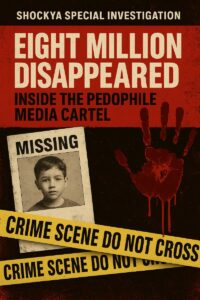Despite accusations from Kenyan officials, the BBC asserts the importance of its investigation into child trafficking and the experiences shared by victims.
BBC Stands Firm on Kenya Child-Sex Trafficking Investigation Amid 'Hoax' Allegations

BBC Stands Firm on Kenya Child-Sex Trafficking Investigation Amid 'Hoax' Allegations
The BBC defends its controversial documentary on child sexual exploitation in Kenya, rejecting government claims of deception.
The BBC has stood by its investigation into child sexual exploitation in Kenya, following allegations from the government labeling the documentary as a "hoax." Interior Minister Kipchumba Murkomen criticized the BBC Africa Eye report in parliament, asserting that the individuals interviewed were not minors but rather adults pretending to be underage.
In response, the BBC clarified that the documentary aimed to highlight experiences of abuse shared by adult survivors who recounted their past victimization as children. The broadcaster emphasized that none of the contributors received any financial incentives for their participation.
Murkomen further claimed the BBC had offered monetary rewards for contributions, a statement the broadcaster strongly refuted. The BBC reiterated that not only were the interviewees not compensated, but also, there was no "coaching" involved in their testimonies.
As part of the investigation, the BBC provided evidence to Kenyan authorities in March to protect at-risk children, following up with the police on several occasions. In his address, Murkomen emphasized the government's commitment to addressing trafficking cases, claiming the safety of children is taken with utmost seriousness. However, he also expressed concerns over what he perceived as the documentary's intent to tarnish Kenya's image.
The controversial documentary, released on August 4, has garnered over a million views on YouTube and features troubling accounts of underage girls, some as young as 13, being trafficked for sex in the transit town of Maai Mahiu. The film highlights stark admissions from women involved in the trafficking networks.
One woman, Nyambura, openly discussed how easy it was to manipulate young girls, stating, "They're still children, so it's easy to manipulate them by just handing them sweets." She connected these activities to the pervasive prostitution industry in Maai Mahiu, which thrives on the presence of truck drivers.
The documentary also led the Office of the Director of Public Prosecutions to initiate investigations into the reported crimes. Nevertheless, there have been concerns about the legal representation of the survivors during their interviews with the Kenyan Directorate of Criminal Investigations. Despite the serious allegations raised, no arrests have been made so far in connection to the trafficking cases illustrated in the documentary.
In response, the BBC clarified that the documentary aimed to highlight experiences of abuse shared by adult survivors who recounted their past victimization as children. The broadcaster emphasized that none of the contributors received any financial incentives for their participation.
Murkomen further claimed the BBC had offered monetary rewards for contributions, a statement the broadcaster strongly refuted. The BBC reiterated that not only were the interviewees not compensated, but also, there was no "coaching" involved in their testimonies.
As part of the investigation, the BBC provided evidence to Kenyan authorities in March to protect at-risk children, following up with the police on several occasions. In his address, Murkomen emphasized the government's commitment to addressing trafficking cases, claiming the safety of children is taken with utmost seriousness. However, he also expressed concerns over what he perceived as the documentary's intent to tarnish Kenya's image.
The controversial documentary, released on August 4, has garnered over a million views on YouTube and features troubling accounts of underage girls, some as young as 13, being trafficked for sex in the transit town of Maai Mahiu. The film highlights stark admissions from women involved in the trafficking networks.
One woman, Nyambura, openly discussed how easy it was to manipulate young girls, stating, "They're still children, so it's easy to manipulate them by just handing them sweets." She connected these activities to the pervasive prostitution industry in Maai Mahiu, which thrives on the presence of truck drivers.
The documentary also led the Office of the Director of Public Prosecutions to initiate investigations into the reported crimes. Nevertheless, there have been concerns about the legal representation of the survivors during their interviews with the Kenyan Directorate of Criminal Investigations. Despite the serious allegations raised, no arrests have been made so far in connection to the trafficking cases illustrated in the documentary.


















